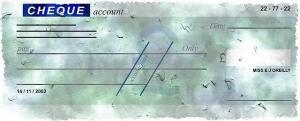
If you’ve been in business for any appreciable amount of time it’s likely that you’ve encountered bad checks. These are checks you deposit that can’t be paid by the writer’s bank because the account drawn on has insufficient funds to cover the amount or the signature does not match. This is how they get the designation NSF ( non-sufficient funds).
Not only do bad checks cause problems for your cash flow, but they also end up costing you extra money in fees. Thankfully, several methods are available to businesses to collect on these returned checks, and many of them can be reasonably quick and painless.
Need a Collection Agency to recover money due to Bad/Bounced Checks?
|
When considering your approach, you should do whatever you can to avoid legal action. Lawsuits in small claims courts are costly and time-consuming. Also, because it’s your responsibility to collect any judgments you’re awarded, lawsuits are frequently ineffective, even when you win. Half of all judgments go uncollected, which means you may very well incur legal fees for no reason.
Here are five ways you can attempt to collect what’s owed you without resorting to court.
Call Your Customer’s Bank
The good news is that most people don’t write bad checks intentionally. More often than not they’re simply unaware that they don’t have the funds available. It could be that a check they’d written months ago was suddenly deposited. Or they miscalculated their account balance.
Whatever the case, it’s likely that the shortfall will be rectified once the check-writer is alerted to his or her mistake. So wait a few days and then ask the bank to check if funds are now available. If they are, you can redeposit the check.
The bank may also offer an enforced collection service. This will capture the needed funds from the next deposit your customer makes automatically.
Contact Your Customer
If you have your customer’s email address or phone number you can contact them to make them aware of the situation. This might feel pushy, but honest customers will usually welcome the alert. If they haven’t already gotten word from their bank your communication could help them avoid further bounced checks.
You can send your customer a certified letter if you don’t have immediate contact information. Not only does this alert them to the situation, but it also establishes a paper trail that could prove useful if your collection attempts prove unsuccessful.
Whichever way you make contact, politely and professionally ask for a payment, offering a number of alternative payment options.
Try a Check Recovery Service
Remembering to check in with your customer’s bank on a regular basis is difficult, and people frequently forget. This can be a problem because you only get three attempts to redeposit, and you don’t want to do that if you don’t know there are funds available. A better option is to use a check recovery service.
The provider of the service will monitor your customer’s account balance for you on a daily basis and then strategically redeposit the check when it’s most likely to be paid. This is a “set it and forget it” service, maximizing your chances of getting paid.
Best of all, you’ll get the full value of the check because check recovery services are nearly always free. Payment is taken as a fee charged to the bad check writer. Of course, the service can only work if the customer eventually deposits sufficient funds, and your check hits their account before those funds go elsewhere.
These are third-party services that guarantee payment on checks up to a certain amount. They can be beneficial but do come with a cost, so it’s essential to determine whether the benefits outweigh the expenses for your specific practice.
Your District Attorney’s Office May Be Able to Help
If you’ve exhausted friendlier options, you may find some relief through your local district attorney’s office. In some areas, they’ll send a letter on your behalf requesting an immediate satisfaction of the debt in order to avoid prosecution.
While this is generally an empty threat, the scare value alone is often enough to spur your customer into action.
Contact a Collection Agency
Contact a good collection agency if you’ve still found no relief after attempting everything listed previously. This is the most expensive option that doesn’t involve small claims, on average charging 40% of any amount collected, but it can help recover some portion of what’s owed you. Parting with 40% of something is always preferable to keeping the entirety of nothing.
The benefit of using a collection agency is that they’ll take over the entire collections process for you, freeing your time to focus on your business. Depending on the provider, it won’t cost you anything if they’re unsuccessful, so it’s certainly worth the attempt.
Remember that lawsuits are expensive, and any judgment you’re awarded could cost you considerably more when you attempt to collect it. It’s advisable to avoid court unless the amount owed is sufficiently high to warrant the cost and effort. As a method of last resort, a collection agency is a much better choice.